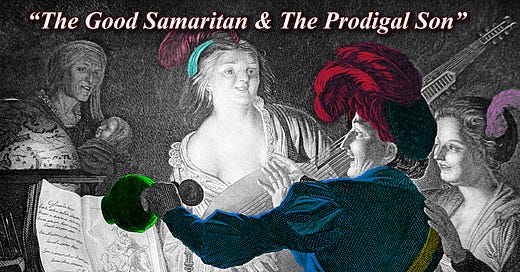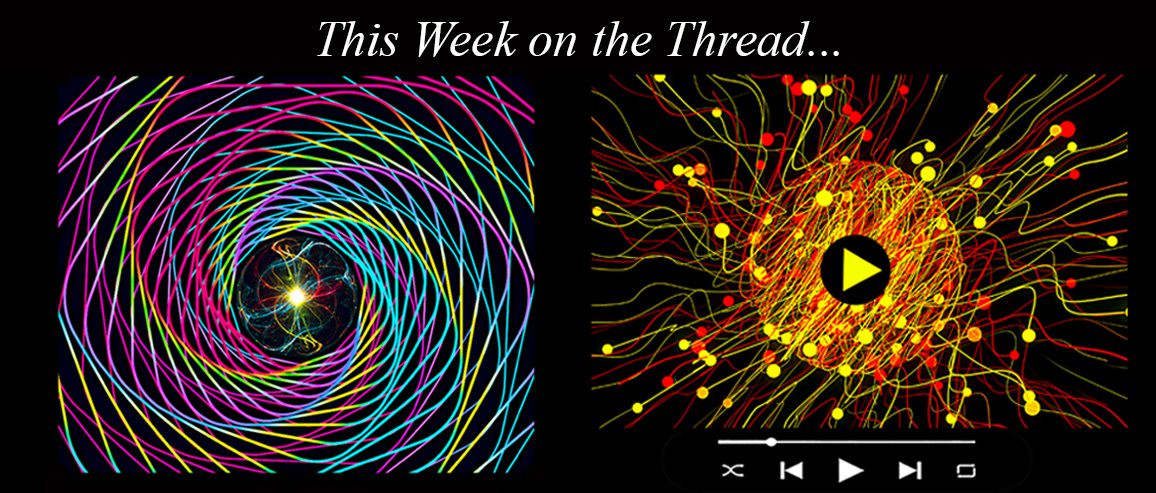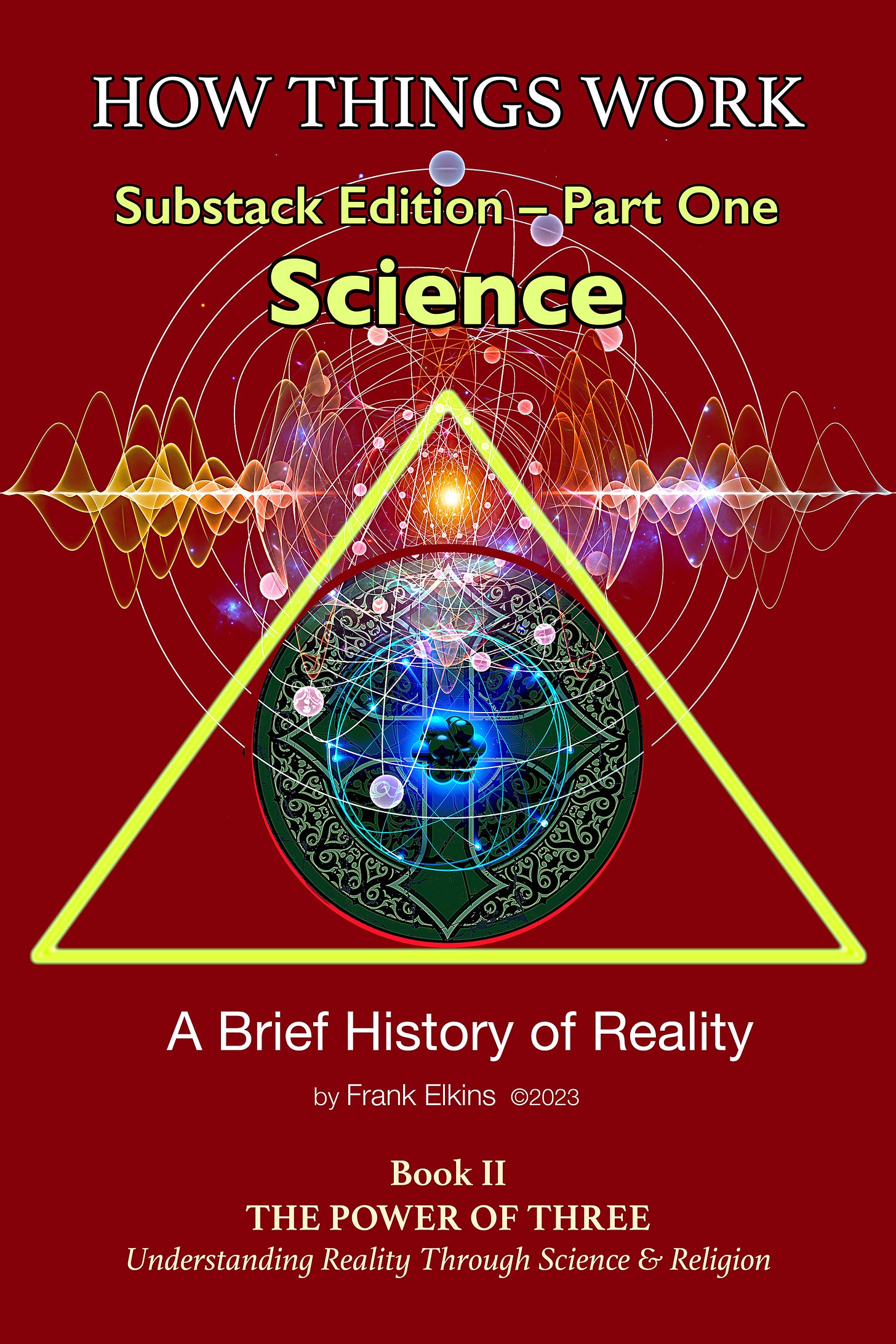"The Good Samaritan & The Prodigal Son"
How Things Work – Consideration #132 (Book II Science & Religion)
Be A Part of the Conversation!
Tuesday April 23, 2024
“The difference between mercy and grace? Mercy gave the prodigal son a second chance. Grace gave him a feast.”
– Max Lucado
On the parable of the Good Samaritan: "I imagine that the first question the priest and Levite asked was: 'If I stop to help this man, what will happen to me?' But by the very nature of his concern, the good Samaritan reversed the question: 'If I do not stop to help this man, what will happen to him?”
– Dr. Martin Luther King Jr.
PREFACE
Welcome Everybody!
Two of Jesus’ most well-known parables appear only in the gospel of Luke: The Good Samaritan and The Prodigal Son. In the story of the good Samaritan, Jesus reveals the meaning behind the commandment to love your neighbor.
The Good Samaritan
On one occasion an expert in the law stood up to test Jesus. “Teacher,” he asked, “what must I do to inherit eternal life?”
“What is written in the Law?” he replied. “How do you read it?”
He answered, “‘Love the Lord your God with all your heart and with all your soul and with all your strength and with all your mind’; and, ‘Love your neighbor as yourself.’”
“You have answered correctly,” Jesus replied. “Do this and you will live.”
But he wanted to justify himself, so he asked Jesus, “And who is my neighbor?”
In reply Jesus said: “A man was going down from Jerusalem to Jericho, when he was attacked by robbers. They stripped him of his clothes, beat him and went away, leaving him half dead. A priest happened to be going down the same road, and when he saw the man, he passed by on the other side. So too, a Levite, when he came to the place and saw him, passed by on the other side.
But a Samaritan, as he traveled, came where the man was; and when he saw him, he took pity on him. He went to him and bandaged his wounds, pouring on oil and wine. Then he put the man on his own donkey, brought him to an inn and took care of him. The next day he took out two denarii and gave them to the innkeeper. ‘Look after him,’ he said, ‘and when I return, I will reimburse you for any extra expense you may have.’
“Which of these three do you think was a neighbor to the man who fell into the hands of robbers?”
The expert in the law replied, “The one who had mercy on him.”
Jesus told him, “Go and do likewise.”
Luke 10:25-37
To understand this story, it must be understood that the Jews looked down on Samaritans. They were not allowed in the Temple and Jews generally did not deal with them. Thus, the Samaritan had every right to pass by the “man”, likely a Jew because he was traveling from Jerusalem, since the Jews despised him.
“The Samaritan followed the Golden Rule by treating others the way he would want to be treated…”
However, unlike the priest, and the Levite, both righteous Jews, the Samaritan’s heart was pure. He did not see the injured man as a “Jew,” but as a fellow human being, a neighbor. The Samaritan followed the Golden Rule by treating others the way he would want to be treated, making the Samaritan more righteous than the priest and the Levite. This story, also once again demonstrates Luke’s concept of Jesus as the “Son of God” whose message is not limited to only Israel, or the Jews, but is open to all people.
CONSIDERATION – The Prodigal Son
The parable of the prodigal son is one of Jesus’ most famous parables, and only appears in the Gospel of Luke. There are many analogies and metaphors attributed to this parable, however, we will consider the two most widely acknowledged interpretations.
Jesus continued: “There was a man who had two sons. The younger one said to his father, ‘Father, give me my share of the estate.’ So he divided his property between them.
“Not long after that, the younger son got together all he had, set off for a distant country and there squandered his wealth in wild living. After he had spent everything, there was a severe famine in that whole country, and he began to be in need. So he went and hired himself out to a citizen of that country, who sent him to his fields to feed pigs. He longed to fill his stomach with the pods that the pigs were eating, but no one gave him anything.
“When he came to his senses, he said, ‘How many of my father’s hired servants have food to spare, and here I am starving to death! I will set out and go back to my father and say to him: Father, I have sinned against heaven and against you. I am no longer worthy to be called your son; make me like one of your hired servants.’ So he got up and went to his father.
“But while he was still a long way off, his father saw him and was filled with compassion for him; he ran to his son, threw his arms around him and kissed him.
“The son said to him, ‘Father, I have sinned against heaven and against you. I am no longer worthy to be called your son.’
“But the father said to his servants, ‘Quick! Bring the best robe and put it on him. Put a ring on his finger and sandals on his feet. Bring the fattened calf and kill it. Let’s have a feast and celebrate. For this son of mine was dead and is alive again; he was lost and is found.’ So they began to celebrate.
“Meanwhile, the older son was in the field. When he came near the house, he heard music and dancing. So he called one of the servants and asked him what was going on. ‘Your brother has come,’ he replied, ‘and your father has killed the fattened calf because he has him back safe and sound.’
“The older brother became angry and refused to go in. So his father went out and pleaded with him. But he answered his father, ‘Look! All these years I’ve been slaving for you and never disobeyed your orders. Yet you never gave me even a young goat so I could celebrate with my friends. But when this son of yours who has squandered your property with prostitutes comes home, you kill the fattened calf for him!’
“‘My son,’ the father said, ‘you are always with me, and everything I have is yours. But we had to celebrate and be glad, because this brother of yours was dead and is alive again; he was lost and is found.’”
Luke 15:11-32
There is a man with two sons. His younger son demands his inheritance immediately, one-third of his father’s wealth and property, prior to his father’s death. This reflects that human beings often do not want to wait for what they deserve, they want things right away without working or sacrificing anything. However, the father grants his son’s request, indicating that God will allow us free will even when it may be harmful to us.
A wise father, or God, allows his children to make decisions, and experience and learn from their own mistakes; hoping they will recognize the depth and truth of his love for them, and they will return to their senses and “come home.” The son seeks to leave his father’s house and laws, in exchange for the “pagan world,” where he can live a life of decadence and self-indulgence with no consequence. He would no longer have to live under his father’s law.
“this reckless lifestyle eventually leads him into poverty, humiliation, and despair, symbolizing the inevitable result of living in a state of sin.”
However, this reckless lifestyle eventually leads him into poverty, humiliation, and despair, symbolizing the inevitable result of living in a state of sin. Realizing, and understanding his stupidity and ignorance, he humbly seeks to return home and beg his father’s forgiveness. His son is truly repentant in his heart. He now realizes that even his father’s servants are much better off than he is.
After confessing his sins to his father, his father immediately rejoices at the return of his son. He celebrates the “miracle” with a great feast, because once his son was dead, separated from his true home and father’s love, but now he is alive again, having physically returned home and reconnected with his natural home and family. God, like the loving father in this story misses us, and rejoices when we return to Him of our own free will.
“People often feel slighted when attention, love, or praise is not attributed to them.”
However, his older brother is jealous because of his younger brother receiving so much joy, love, and even a feast, when he has been working and obeying his father forever and didn’t even get a goat! People often feel slighted when attention, love, or praise is not attributed to them.
However, the father points out that the older brother has lost nothing, everything that was his, is still his. However, now he has even more, because his brother is home and “alive again” in their lives. Therefore, he should join in celebrating his return.
So, what is the moral of this story?
POSTSCRIPT
The first interpretation reflects a God who is loving, forgiving, and seeks the best for all His children. However, human beings are sinful by nature, and in addition, God gives human beings free will. That means that people often willingly separate themselves from God, putting themselves into a state of sin.
“human beings are sinful by nature, and in addition, God gives human beings free will.”
However, living in a state of sin is not beneficial or satisfying for us in the long run. If we can realize we are living in a state of sin, and that it is in our own best interest not to be there, we can return home to God, and He will be happy to have us back! God is waiting for us to make the “right” decision so that He can celebrate our return. However, the choice is always ours.
The second common interpretation is that the older son represents Israel, and the younger son symbolizes the Gentiles. The older brother has been subject to God’s law for a long time, whereas the younger brother, the Gentiles, have been living the “good life” sinning against God without being subject to His law. Why should they now be allowed into the Kingdom?
“Because Luke is writing to mainly Gentile Christians, this idea is of particular importance for them.”
This question of “Gentiles” as “Christians” would become the first major obstacle of the “new” Christian church after Jesus’ death. This story encourages Jews to rejoice and celebrate the return of their “lost” brothers, the Gentiles. Because Luke is writing to mainly Gentile Christians, this idea is of particular importance for them. This may be the reason why the parable of the prodigal son enjoys such an expanded focus in Luke.
The word “prodigal” means wasteful, or neglectful, particularly in regard to money. Spending money with reckless abandon would be an example of being prodigal. This parable is actually the third in a set of parables related to the concept of God’s love in terms of redemption.
“Only in Luke, is the idea of God’s love and redemption expanded and explained in such detail.”
The first is the parable of the lost sheep, which also appears in Matthew. The second is the lost coin, which only appears in Luke. However, both of these parables are extremely short and brief. Only in Luke, is the idea of God’s love and redemption expanded and explained with such detail as in the Prodigal Son. Why this third parable does not exist in the other Gospels is not known. However, what we do know is that Luke was a meticulous researcher.
Next week we begin a consideration of the final gospel and why it is not considered part of the synoptic gospels…
Excerpt From This Week’s “Untangling the Knots of Reality Podcast…
• PODCAST #92: “Untangling Time Dilation”
“How did Einstein make time travel scientifically possible?” “What is the fundamental link between space and time?” “How does speed affect our perception of time?” “Is Time Dilation real?” “How does Quantum Mechanics solve time paradoxes?” These are some of the knots we will attempt to untangle in this week’s podcast. That’s a lot of stuff about time for one podcast! So, let’s get started…
• REALITY BY A THREAD: “The 10 Commandments for Artificial Intelligence” (Excerpt)
(The 10 Commandments given to Moses from “God” in the Old Testament serve remarkably well as a blueprint for governing Artificial Intelligence… By shifting the “religious” connotations of the original commandments into a more “logical” axiomatic construction designed specifically for AI, we gain a unique opportunity to expand our understanding and perspective related to God, Reality, Artificial Intelligence, and ourselves.)
• FREE PDF DOWNLOADS of Book IV: “The Cosmic Symphony – Overtones of String Theory” plus other Free Books, Discounts and Benefits. Also Gain Complete Access to all Previous Podcasts and Threads!
UPGRADE NOW!
If you have ever wanted a Deeper Knowledge of Science, wished you could Understand Einstein, or are curious to Know What Quantum Mechanics Is All About without needing a degree in Math or Science this book is for you…
CLICK IMAGE to LEARN MORE….
NEW EXPANDED SUBSTACK EDITION – OVER 150 PAGES OF NEW CONTENT & COMMENTARY!
• What is the distinction between Knowledge, Understanding, and Meaning?
• What is the Essential Difference between Eastern and Western philosophy?
• How did this distinction allow the West to Expand the Possibility of Dualism?
• What is the Metaphysical Foundation supporting the Age of Science?
• What are the Basic Principles of “Classical Physics?”
• What does Einstein's Special Theory of Relativity tell us about energy and matter?
• How did Einstein's General Theory of Relativity alter our perception of the universe?
• How did Quantum Mechanics change our conception of reality?
• What is the Mystery that Transcends Physics and Metaphysics?





